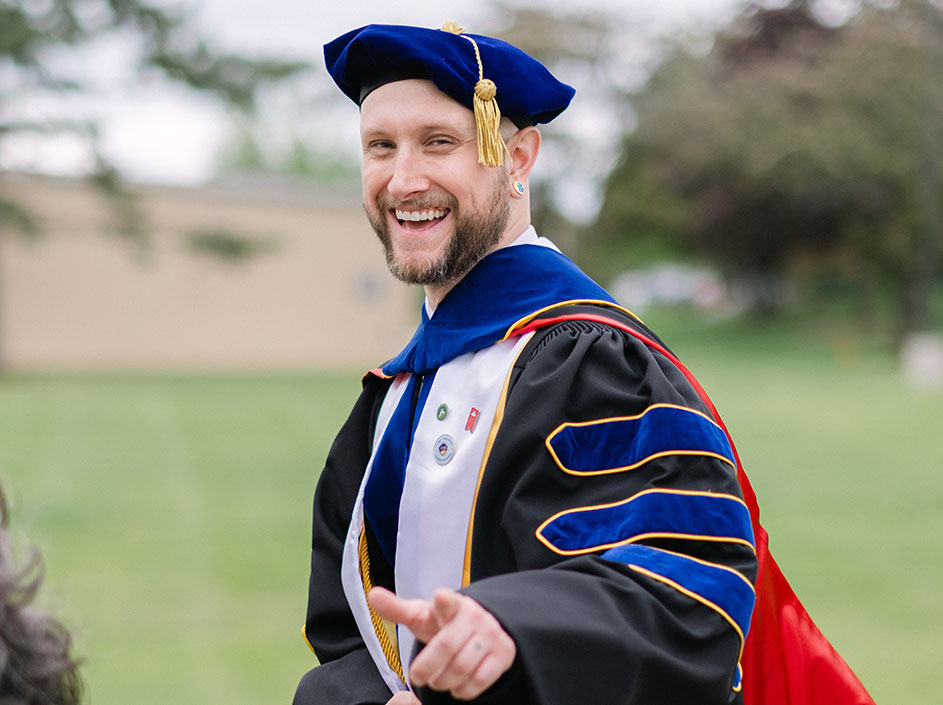What's it like to study psychology at CLC?

A Q&A with faculty member Dr. Brent Steffens on why a focus on students, real-world experiences and lots of support make all the difference
Dr. Brent Steffens is a psychology instructor at College of Lake County who brings psychology to life through hands-on activities, real-world connections and thoughtful use of current events to keep material engaging and relevant. He is also known for building community through platforms like the CLC podcast and radio show The Ball is in Your Court.
Q: Introduce yourself and your connection to CLC.
I took my first psychology course at CLC way back when I started my college career, and it paid dividends. It sparked my curiosity and shaped the direction of my academic and professional life. Today, I’m a tenure-track faculty member in psychology, and I’ve been teaching at CLC for two years.
I see myself as a student advocate above all else. From the faculty to the deans, there’s a strong culture here that places students at the center of every conversation. I believe in literally meeting students where they are, whether that’s hosting office hours in the cafeteria or being present at campus events like convocation or commencement. Our students are climbing their own ladders, and I see my role as offering them “sticky notes of knowledge” that help them continue the climb. It’s easy to champion students in an environment that’s built around their success.
Q: What’s a noticeable positive change you’ve seen at CLC?
I’ve noticed a significant and positive shift in how we approach student needs. There’s a growing emphasis on meeting students where they are, both figuratively and literally. We’ve moved away from the traditional model where faculty dictate the terms and students follow. Instead, we shape ourselves around the real needs and challenges our students face.
Many of our students are balancing work, family responsibilities and other commitments alongside their studies. As educators, we are becoming more holistic in our approach. We help students navigate mental health, career advising and personal growth. There is no one-size-fits-all model anymore. Helping students connect the dots between their identity, their goals and their academic paths brings out the best in them. We are building a stronger sense of community where students can belong, find their people and be supported.
Q: What’s special about how CLC has adapted to meet the needs of students and faculty?
One of the most exciting developments is how CLC is integrating student life and academics. These two areas should not be separate. They are part of a unified experience that supports growth, learning and self-discovery.
For faculty, there’s a genuine encouragement of innovation. I’ve had the opportunity to mentor students through original psychological research, and I’ve brought their voices to life through our podcast and radio show, The Ball is in Your Court. We highlight student perspectives, promote campus resources and celebrate accomplishments across the college. I’ve even had one of my students present their research at an international conference. Experiences like these are possible because of CLC’s supportive culture and its student-centered approach. It’s not just about classroom learning. It’s about creating enriched, authentic and empowering experiences.
Q: What role have you played in CLC’s evolution, and how do you see that impacting outcomes for students?
I see my role as a connector. I engage with different departments to bring best practices into the classroom. Students see faculty every day. We are often the most consistent presence in their academic journey, so we have a responsibility to elevate that experience.
Through my work, I’ve helped students gain confidence by conducting research, learning how to host a podcast, or getting involved in student clubs. These activities help prepare them for life after CLC. I’ve also had the privilege of supporting students through scholarship opportunities and introducing them to resources they may not have known existed. All of this helps students see new possibilities, find their voice and discover their direction a little earlier.
Q: What excites you about where CLC is heading?
I’m energized by how CLC continues to deepen its roots in the community. For example, a fellow faculty member took her students to the courthouse for an immersive learning experience. There’s been some amazing opportunities for community building and scholarship through programs like Student Governance, PTK and CLC Scholars. In my social psychology class, we’ve connected with the SHARE Market to help students learn while giving back. These partnerships make education relevant and help bridge the gap between the classroom and the world around us.
There’s a real openness to collaboration at CLC. Whether it’s with colleagues, student affairs, counseling and psychological services or tutoring services, I know I can always find the people I need to bring a project to life. We have a community of educators who are committed and who show up for students, and that kind of consistency matters.
At this year’s commencement, I reminded the audience, “We often think that faculty should inspire the students they teach, but the opposite is also true. Faculty are inspired by students.” That belief guides everything I do.
Dr. Steffens received the 2025 CLC Outstanding Full-Time Faculty Member Award. This award is selected annually by students.
